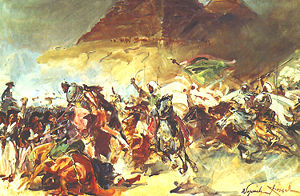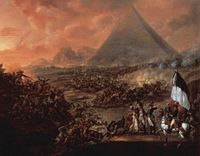Difference between revisions of "Battle of the Pyramids" - New World Encyclopedia
m |
|||
| Line 26: | Line 26: | ||
[[Image:Francois-Louis-Joseph Watteau 001.jpg|thumb|left|200px|''Battle of the Pyramids,'' [[Francois-Louis-Joseph Watteau]], 1798-1799.]]Napoleon's invasion of Egypt was almost certainly intended to be a stepping stone for further imperial expansion in the East, perhaps with the intent of equaling the achievements of [[Alexander the Great]]. Exactly why Napoleon invaded Egypt, however, has been subject to speculation with his own account suggesting that it was for the glory: | [[Image:Francois-Louis-Joseph Watteau 001.jpg|thumb|left|200px|''Battle of the Pyramids,'' [[Francois-Louis-Joseph Watteau]], 1798-1799.]]Napoleon's invasion of Egypt was almost certainly intended to be a stepping stone for further imperial expansion in the East, perhaps with the intent of equaling the achievements of [[Alexander the Great]]. Exactly why Napoleon invaded Egypt, however, has been subject to speculation with his own account suggesting that it was for the glory: | ||
| − | <blockquote>If, when we conclude peace with England, we give up the Cape of Good Hope, we should take Egypt ... [turning to address the navy] without you we could only carry the glory of the French name to a small port of the Continent; with you, we shall cross the seas and out national glory shall be witnessed by the most distant shores ( | + | <blockquote>If, when we conclude peace with England, we give up the Cape of Good Hope, we should take Egypt ... [turning to address the navy] without you we could only carry the glory of the French name to a small port of the Continent; with you, we shall cross the seas and out national glory shall be witnessed by the most distant shores.<ref>R.M. Johnston (ed), ''The Corsican: A Diary of Napoleon's Life In His Own Words'' (Whitefish, MT: Kessinger Publishing, 2004, ISBN 978-1417915361), 69.</blockquote> |
When Napoleon left France for Egypt in July 1798, he did not only take his 38 soldiers but scholars, botanists, and cartographers. Although Napoleon did not succeed in colonizing Egypt, his scholars and short-lived administration there nonetheless profoundly changed the course of Egyptian history and also introduced Egypt to Europe, where [[Egyptology]] quickly became a popular subject. His team wrote a 22 volume work, the ''Descriptions de L'Egypte,'' and took the [[Rosetta Stone]] with its Greek and Egyptian script back to France. This would enable scholars to decipher Egyptian hieroglyphs. Egypt also turned to Europe. Some eminent Egyptians would study in or visit France, such as the reformer Muhammad Abduh (1849–1905) who lived there from 1884 to 1888, co-publishing a newspaper with Jamal-Ud-Din Afghani (1838–1897). In 1875, when Egypt adopted a modern legal system, it would base it on the [[Napoleonic Code]]. Many middle and upper class Egyptians still speak French as a second language. | When Napoleon left France for Egypt in July 1798, he did not only take his 38 soldiers but scholars, botanists, and cartographers. Although Napoleon did not succeed in colonizing Egypt, his scholars and short-lived administration there nonetheless profoundly changed the course of Egyptian history and also introduced Egypt to Europe, where [[Egyptology]] quickly became a popular subject. His team wrote a 22 volume work, the ''Descriptions de L'Egypte,'' and took the [[Rosetta Stone]] with its Greek and Egyptian script back to France. This would enable scholars to decipher Egyptian hieroglyphs. Egypt also turned to Europe. Some eminent Egyptians would study in or visit France, such as the reformer Muhammad Abduh (1849–1905) who lived there from 1884 to 1888, co-publishing a newspaper with Jamal-Ud-Din Afghani (1838–1897). In 1875, when Egypt adopted a modern legal system, it would base it on the [[Napoleonic Code]]. Many middle and upper class Egyptians still speak French as a second language. | ||
Revision as of 20:59, 21 June 2011
| Battle of the Pyramids | |||||||
|---|---|---|---|---|---|---|---|
| Part of the French Revolutionary Wars | |||||||
 Battle of the Pyramids by Wojciech Kossak | |||||||
| |||||||
| Combatants | |||||||
| France | Mamluks | ||||||
| Commanders | |||||||
| Napoleon Bonaparte | Murad Bey, Ibrahim Bey | ||||||
| Strength | |||||||
| 25,000 men | 50,000-75,000 men | ||||||
| Casualties | |||||||
| 300 dead | 4,000-6,000 dead or wounded | ||||||
The Battle of the Pyramids was a battle fought on July 21, 1798 between the French army in Egypt under Napoleon Bonaparte and local Mamluk forces. It was the first of many battles of the Egyptian expedition of 1798–1799. Throughout the campaign, Napoleon proved to be a visionary and gifted commander. It was in this battle that he introduced one of his significant contributions to tactics, the massive divisional square.
Although Napoleon remained in Egypt for less than three years, he left behind scholars and artists who later brought back many artifacts, much knowledge, and treasure to Europe. Ancient Egypt captured the European imagination. Egypt, too, developed a relationship with France and with French culture that irrevocably changed its cultural, social, and political life. Egypt would later adopt the Napoleonic Code. The invasion saw the birth of Egyptology as a field of study.
Napoleon's Invasion of Egypt
Napoleon's invasion of Egypt was almost certainly intended to be a stepping stone for further imperial expansion in the East, perhaps with the intent of equaling the achievements of Alexander the Great. Exactly why Napoleon invaded Egypt, however, has been subject to speculation with his own account suggesting that it was for the glory:
If, when we conclude peace with England, we give up the Cape of Good Hope, we should take Egypt ... [turning to address the navy] without you we could only carry the glory of the French name to a small port of the Continent; with you, we shall cross the seas and out national glory shall be witnessed by the most distant shores.Cite error: Closing
</ref>missing for<ref>tag
The real winners, says Rosensweig, were the scholars, who opened Europe's eyes to the splendor that was Egypt's heritage:
Astounded by the depth of Egypt's previously unknown splendours, they opened the eyes of France and the West to the mysteries of that country. So enchanted were the French by their role in the 'conquest' of Egypt, as Napoleon succeeded in convincing them, that for a century French art and culture would continue to glorify it." [1]
Egyptians may have caught a taste of freedom from awareness of the revolutionary, egalitarian spirit of France. However, Egypt also became a theater for European imperial ambition. Effectively, Egypt became a British possession from 1883 until 1956.[2] Napoleon had wanted to free Egypt from Ottoman rule and under the leadership of Muhammad Ali Pasha, the Egyptians effectively did achieve autonomy, if not full independence.
See Also
Notes
- ↑ Rosensweig, Brahm, Napoleon in Egypt. Retrieved August 23, 2007.
- ↑ Tour Egypt Net, British Occupation Period. Retrieved August 23, 2007.
ReferencesISBN links support NWE through referral fees
- Bierman, Irene A. Napoleon in Egypt. Reading, UK Gustave E. von Grunebaum Center for Near Eastern Studies, 2003. ISBN 9780863722998
- Downs, Jonathan. Discovery at Rosetta: The Stone that Unlocked the Mysteries of Ancient Egypt. Skyhorse Publishing, 2008. ISBN 978-1602392717
- Jabartī, Abd al-Raḥmān, de Bourrienne, Louis Antoine Fauvelet, and Said, Edward W. Napoleon in Egypt: Al-Jabartî's Chronicle of the First Seven Months of the French Occupation, 1798. Princeton, NJ: M. Wiener, 1993. ISBN 9781558760691
- Johnston, R.M. (ed) The Corsican: A Diary of Napoleon's Life In His Own Words. Whitefish, MT: Kessinger Publishing, 2004. ISBN 978-1417915361
- Lloyd, Christopher. The Nile Campaign: Nelson and Napoleon in Egypt. Newton Abbot: David and Charles; New York, NY: Barnes and Noble, 1973. ISBN 9780715354490
- Runyan, Cory. Napoleon in Egypt, or Egomaniac on the Loose. Retrieved August 23, 2007.
- Strathern, Paul. Napoleon in Egypt: A Clash of Cultures. London: Jonathan Cape, 2007. ISBN 9780224076814
Credits
New World Encyclopedia writers and editors rewrote and completed the Wikipedia article in accordance with New World Encyclopedia standards. This article abides by terms of the Creative Commons CC-by-sa 3.0 License (CC-by-sa), which may be used and disseminated with proper attribution. Credit is due under the terms of this license that can reference both the New World Encyclopedia contributors and the selfless volunteer contributors of the Wikimedia Foundation. To cite this article click here for a list of acceptable citing formats.The history of earlier contributions by wikipedians is accessible to researchers here:
The history of this article since it was imported to New World Encyclopedia:
Note: Some restrictions may apply to use of individual images which are separately licensed.
